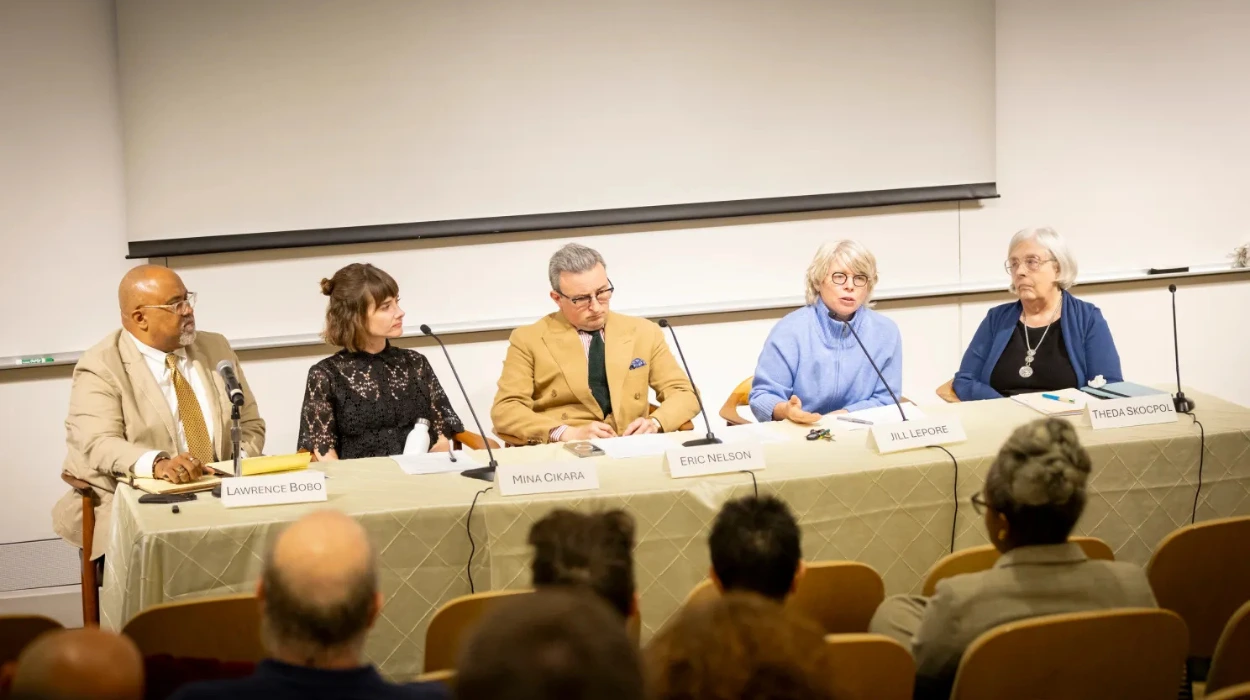US (Transatlantic Today) – With the US presidential election fast approaching, Harvard’s Dean of Social Science, Lawrence D. Bobo, convened a panel of esteemed faculty members to analyze the state of the nation’s political system. The discussion featured insights from historians, sociologists, political theorists, and psychologists, aiming to provide a deeper understanding of the current electoral climate.
A Forum for Interdisciplinary Perspectives
Bobo, who also serves as the W.E.B. Du Bois Professor of the Social Sciences, emphasized the need for interdisciplinary dialogue, stating, “We don’t have enough occasions in the social sciences to share ideas across disciplines to understand key issues.” The panel sought to illuminate the challenges facing American democracy, if not provide reassurance about its future.
Rising Political Polarization and Erosion of Norms
Theda Skocpol, Victor S. Thomas Professor of Government and Sociology, outlined what she described as deliberate efforts by the Republican Party to undermine electoral integrity and governance. Citing research from her books The Tea Party and the Remaking of Republican Conservatism and Rust Belt Union Blues, she detailed a timeline of actions she termed “legal hardball”—strategies used to consolidate power and weaken democratic norms.
Eric Nelson, Robert M. Beren Professor of Government, offered a counterperspective. While acknowledging the Republican Party’s radicalization, he argued that both parties have engaged in a cycle of norm-breaking, beginning with Democratic opposition to Reagan’s 1987 Supreme Court nominee, Robert Bork. “The phenomenon we’ve seen is a spiral,” Nelson said, pointing to reciprocal actions such as filibuster eliminations and Supreme Court confirmation battles.
Judicial Conflicts and Constitutional Challenges
Nelson attributed the deepening divide to the increasingly partisan nature of Supreme Court appointments, which has led to mounting frustration from both parties. He noted, “Presidents no longer nominate justices who are at least minimally acceptable to the minority party.” As a result, proposals such as imposing term limits on justices are now being debated, despite constitutional concerns.
Meanwhile, Skocpol highlighted an alarming rise in extra-legal threats, citing examples such as the January 6 Capitol riot and harassment of public officials following false claims about the 2020 election. She warned that “an outright authoritarian movement has emerged, aiming to diminish elections to mere symbolic acts while employing intimidation and quasi-legal tactics.”
Beyond Partisan Politics: The Role of Technology and Psychology
Shifting the conversation beyond party politics, Jill Lepore, David Woods Kemper ’41 Professor of American History, explored the impact of technology on governance. Drawing from her book If Then, she argued that technological advances over the past six decades have eroded institutional trust and exacerbated political dysfunction.
Mina Cikara, a psychology professor specializing in polarization, discussed research on altering people’s meta-perceptions—how individuals believe others view them and their identity groups. She suggested that shifting these perceptions could reduce polarization and open avenues for constructive dialogue.
Constitutional Crisis and Public Perception
During the Q&A session, concerns over democratic stability dominated the discussion. Nelson cautioned that the election results could trigger “terrifying constitutional impasses” and heightened instability. However, he also expressed skepticism about the constant framing of elections as existential threats, warning that “voter fatigue from alarmist rhetoric might desensitize the public to real dangers.”
Lepore agreed, noting that extreme rhetoric has become “standard get-out-the-vote messaging” on both sides. Skocpol, however, countered by questioning whether recognizing threats to democracy should be dismissed as mere rhetoric. Nelson responded that “the sheer volume of warnings may paradoxically cause people to disengage from genuine threats.”
Conclusion: Navigating a Tumultuous Political Landscape
The symposium highlighted the complexities of American political dynamics, from deepening polarization and judicial battles to the influence of technology and psychology. While perspectives varied, all panelists agreed on the importance of fostering critical analysis and open discourse to navigate the country’s democratic challenges.
With the election on the horizon, their insights serve as a crucial reminder of the broader forces shaping the nation’s political future.


























